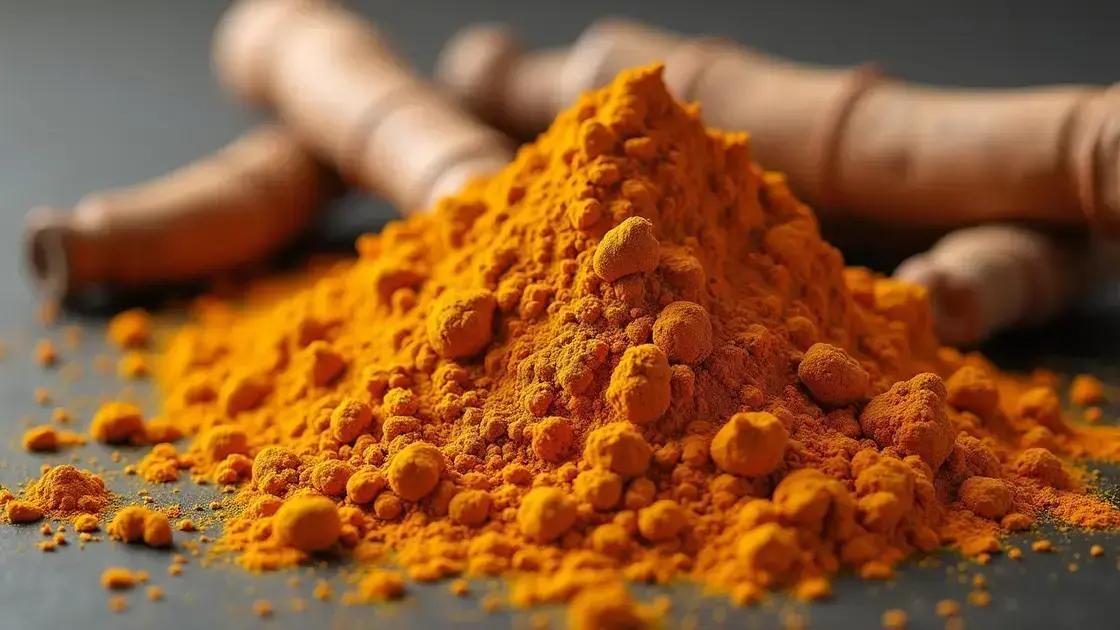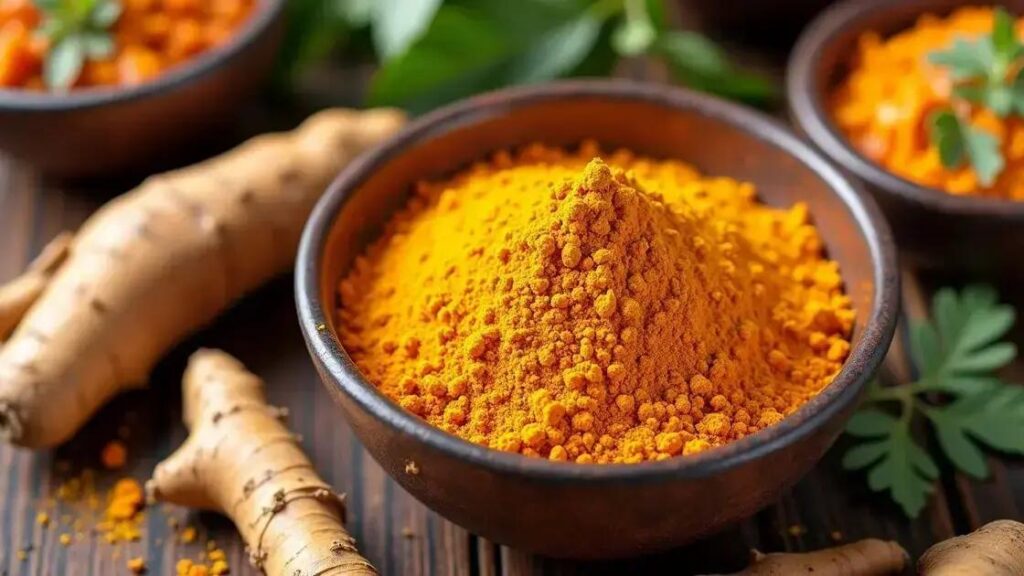The benefits of turmeric for inflammation management include its powerful anti-inflammatory properties, supported by scientific studies. Turmeric, particularly its active compound curcumin, is effective in reducing inflammation markers and is easy to incorporate into your diet through various dishes like golden milk, smoothies, and soups.
Turmeric has gained attention for its remarkable properties in inflammation management. Many people are seeking natural alternatives to reduce discomfort caused by inflammation. In this article, we will explore the benefits of turmeric for inflammation management, backed by scientific research, and practical tips on how to effectively incorporate this golden spice into your diet.
Understanding Inflammation

Understanding Inflammation is vital for appreciating its impact on health. Inflammation is the body’s natural response to injury or infection. It helps protect the body by allowing healing processes to occur. However, sometimes inflammation can become chronic, leading to more serious health issues.
There are two types of inflammation: acute and chronic. Acute inflammation is a short-term response. It occurs when you have an injury, such as a cut or an infection, and typically resolves once the threat is eliminated. Chronic inflammation, on the other hand, lasts for a longer time and can be harmful. It may result from factors like stress, poor diet, and lack of exercise.
During inflammation, the body increases blood flow to the affected area. This can cause redness, warmth, and swelling. Symptoms may include pain and stiffness, affecting daily activities. Managing inflammation is crucial, as it is linked to various diseases such as arthritis, heart disease, and diabetes.
Causes of Inflammation
Common causes of inflammation include infections, physical injuries, and autoimmune diseases. Additionally, certain lifestyle habits, like smoking and excessive alcohol consumption, can contribute significantly.
Recognizing Signs of Inflammation
Recognizing the signs of inflammation can help in early intervention. Look for symptoms like prolonged pain, swelling, or changes in skin color. If these symptoms persist, it’s important to seek medical advice.
In summary, understanding inflammation as a complex biological response can highlight the importance of managing it effectively. Adequate management can lead to improved overall health and well-being.
How Turmeric Works for Inflammation

How Turmeric Works for Inflammation is important for understanding its healing properties. Turmeric contains a powerful compound called curcumin. Curcumin is known for its strong anti-inflammatory effects. It helps block certain enzymes and cytokines in the body that promote inflammation.
When curcumin is consumed, it enters the bloodstream and can affect inflammatory pathways. This means it can lower the levels of inflammatory markers in the body. Research shows that curcumin has the potential to fight chronic inflammation, which is linked to various health issues.
In addition to blocking inflammation, curcumin also possesses antioxidant properties. It helps neutralize free radicals, which can cause cellular damage and contribute to inflammation. By reducing oxidative stress, turmeric can support overall health.
How to Maximize Curcumin’s Effects
Curcumin is not easily absorbed by the body. To improve its absorption, consider consuming turmeric with black pepper. Black pepper contains piperine, a compound that enhances curcumin absorption by up to 2000%. This simple addition can significantly boost the benefits of turmeric.
Potential Benefits of Turmeric for Inflammation
Studies have shown that turmeric may help with conditions like arthritis, joint pain, and even inflammatory bowel disease. It acts as a natural alternative for people seeking relief from inflammation without heavy medications.
By incorporating turmeric into your daily routine, you may begin to experience its beneficial effects on inflammation management. Remember, consistency is key to achieving the best results.
Scientific Studies on Turmeric

Many scientific studies on turmeric have been conducted to explore its benefits, especially concerning inflammation. A notable study published in the Journal of Medicinal Food found that curcumin could significantly reduce markers of inflammation in patients with rheumatoid arthritis. This indicates that turmeric may be helpful for those suffering from chronic conditions.
Another study published in the Annals of Internal Medicine showed that individuals taking curcumin experienced lower levels of pain compared to a control group. This research supports the notion that turmeric offers a natural way to manage discomfort linked to inflammation.
Research on Specific Conditions
Various studies have targeted specific conditions where inflammation plays a key role. In research focusing on inflammatory bowel disease, turmeric showed promise in decreasing symptoms and promoting gut health. In another trial, turmeric was tested against joint pain from osteoarthritis, demonstrating its effectiveness in improving function and reducing pain.
Results from Controlled Trials
Controlled clinical trials have highlighted curcumin’s potential. One such trial indicated that turmeric extract reduced blood levels of interleukin-6, a pro-inflammatory marker, significantly more than a placebo. This suggests that curcumin can play a role in managing inflammation in various diseases.
The accumulated evidence shows turmeric’s beneficial effects on inflammation management and enhances one’s daily health routine. Continuing to explore its use may contribute to better health outcomes for individuals dealing with inflammation.
Incorporating Turmeric into Your Diet

Incorporating turmeric into your diet is easy and can provide numerous health benefits. Here are some simple ways to add this golden spice into your meals:
1. Golden Milk
Golden milk is a popular way to enjoy turmeric. Simply mix a teaspoon of turmeric powder with warm milk or a dairy-free alternative like almond milk. Add a pinch of black pepper and a sweetener like honey to enhance the flavor and absorption of curcumin.
2. Add to Smoothies
Add a teaspoon of turmeric to your morning smoothie for an extra boost. It pairs well with bananas, mangoes, and spinach. This addition not only enhances the color but also adds health benefits you won’t want to miss.
3. Turmeric Rice or Quinoa
When cooking rice or quinoa, simply add a teaspoon of turmeric to the water. This gives the grains a beautiful golden hue and a hint of flavor, making your meals more appealing.
4. Use in Soups and Stews
Add turmeric to your favorite soup or stew recipes. It blends well with hearty ingredients and gives warmth to dishes—great for chilly days!
5. Spice Up Your Vegetables
When roasting vegetables, toss them with turmeric, olive oil, and your favorite seasonings. This will create a delicious and nutritious side dish.
These are just a few ways to incorporate turmeric into your diet. Remember to combine turmeric with black pepper for the best results and maximum absorption of its beneficial properties.
Embracing Turmeric for Better Health
The benefits of turmeric for inflammation management are clear and supported by science. By understanding how turmeric works and incorporating it into your diet, you can enhance your overall health and well-being.
From reducing inflammation to providing natural remedies for various conditions, turmeric stands out as a potent ally in your health journey. Whether you prefer golden milk, turmeric rice, or roasted vegetables, there are plenty of delicious ways to enjoy this vibrant spice.
As you start to include turmeric in your meals, remember to pair it with black pepper for optimal absorption of curcumin. Overall, embracing turmeric could lead to a healthier, more balanced lifestyle.
FAQ – Frequently Asked Questions about Turmeric and Inflammation
What is turmeric and why is it beneficial for inflammation?
Turmeric is a spice known for containing curcumin, a compound with powerful anti-inflammatory properties, making it helpful in managing inflammation.
How can I incorporate turmeric into my diet?
You can add turmeric to your diet through golden milk, smoothies, rice, soups, or roasted vegetables for flavor and health benefits.
Are there any scientific studies supporting turmeric’s effectiveness?
Yes, multiple studies have shown that curcumin from turmeric can reduce inflammation markers and help with conditions like arthritis and joint pain.
What are the best combinations with turmeric for better absorption?
Combining turmeric with black pepper enhances the absorption of curcumin by up to 2000%, making it more effective.
Is turmeric safe to consume daily?
For most people, consuming turmeric in food is safe. However, it’s best to consult a healthcare provider if you plan to take it in supplement form.
Can turmeric interact with medications?
Yes, turmeric may interact with certain medications, especially blood thinners. Always consult a healthcare professional before starting any supplements.













